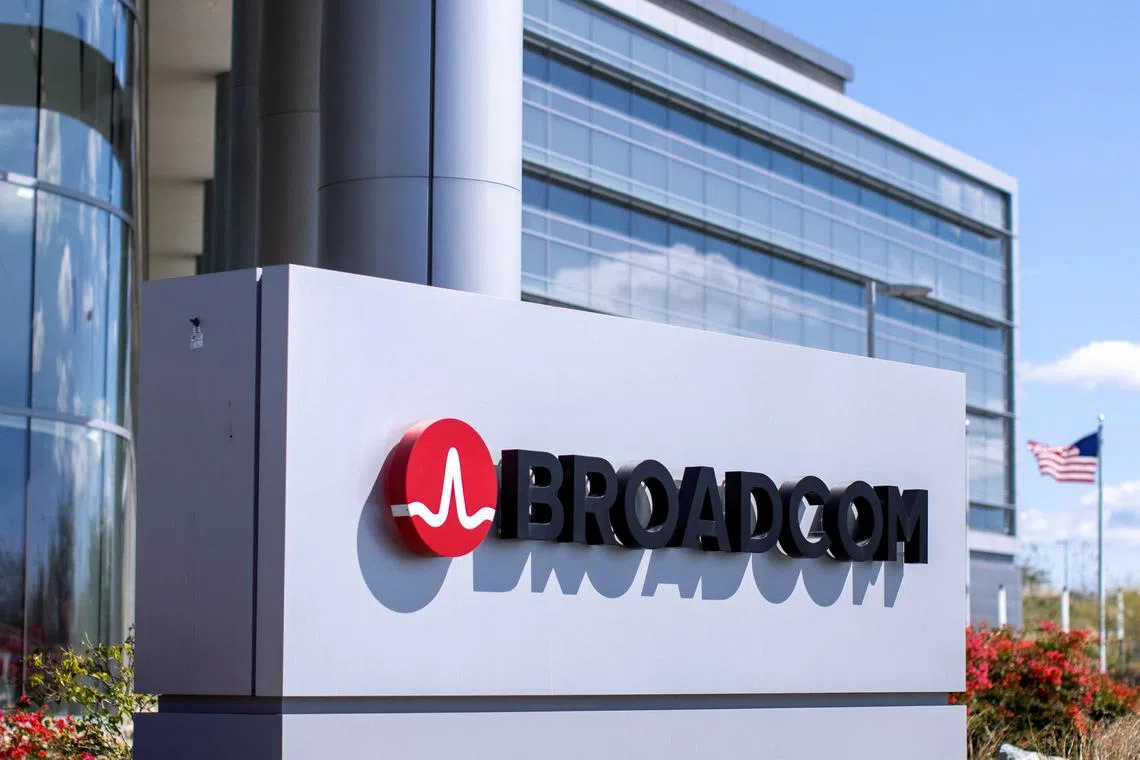Apple plans to drop key Broadcom chip to use in-house design
Sign up now: Get ST's newsletters delivered to your inbox

Apple is developing an in-house replacement for a Broadcom chip that handles both Wi-Fi and Bluetooth functions on its devices.
PHOTO: REUTERS
Los Angeles – Apple’s push to replace the chips inside its devices with home-grown components
As part of the shift, Apple also aims to ready its first cellular modem chip by the end of 2024 or early 2025, letting it swop out electronics from Qualcomm, said the people. Apple had been previously expected to replace the Qualcomm part as soon as this year, but development snags have pushed back the timeline.
Apple is Broadcom’s largest customer and accounted for about 20 per cent of the chipmaker’s revenue in the last fiscal year, amounting to almost US$7 billion (S$9.3 billion).
Qualcomm received 22 per cent of its annual sales from the iPhone maker, representing nearly US$10 billion, although the company has warned for years that its Apple reliance will wane.
Shares of Broadcom fell as much as 4.7 per cent on the news on Monday before paring their decline. The shares closed at US$576.89, down 2 per cent. Qualcomm slid as much as 1.6 per cent before closing at US$114.61, down 0.6 per cent. Apple rose 0.4 per cent to US$130.15.
The moves will further upend a chip industry that makes billions of dollars supplying Apple components. Already, the world’s most valuable technology company has removed most Intel processors from its Mac computers, opting instead to use in-house chips known as Apple Silicon. Now, the changes are hitting the biggest makers of wireless electronics.
The iPhone is Apple’s top moneymaker, generating more than half of its US$394.3 billion in revenue last year. The phone also has helped fuel growth at Broadcom, which refers to Apple as its “large North American customer” during earnings calls. The chipmaker makes a combined component that handles both Wi-Fi and Bluetooth functions on Apple devices.
Apple is developing an in-house replacement for that chip and is aiming to start using it in its devices in 2025, the people said. In addition, it is already working on a follow-up version that will combine cellular modem, Wi-Fi and Bluetooth capabilities into a single component.
Broadcom still supplies Apple with other components – including radio frequency chips and ones that handle wireless charging – although the iPhone maker has been working on customising those parts as well.
During a conference call last month, Broadcom chief executive officer Tan Hock Eng expressed confidence that his company will maintain its foothold at Apple.
“We believe we have the best technology and (are) delivering value to our customers,” he said. “There is no reason to find something else where you are not the best.”
With the shift away from Qualcomm modems, Apple plans to initially just use its home-grown component in one new product, such as a high-end iPhone model. It will then gradually move away from Qualcomm modems during a period that it anticipates will take about three years, similar to how it handled past transitions.
But the swop has not been easy so far. After aiming to launch its own cellular modem by this year, the company faced problems with overheating, battery life and getting the component validated. The iPhone currently works with more than 100 wireless carriers in over 175 countries, which necessitates a lengthy and cumbersome testing process.
A cellular modem is what allows iPhones to handle phone calls and connect to the Internet while away from Wi-Fi, making it the most critical part of the device for most people. If Apple’s offering is inferior to Qualcomm’s component, it could put the company’s flagship product at a significant disadvantage.
Apple and Qualcomm were embroiled in a legal war over royalties and patents related to modems until a settlement in 2019. At the time, Apple deemed the truce necessary to bring 5G support to the iPhone in 2020. The companies agreed that Qualcomm would supply parts to Apple until 2024.
Apple also has had a strained relationship with Broadcom. Mr Tan has a reputation for tough negotiations and forced some customers to commit to non-cancellable orders during the pandemic-fuelled supply crunch.
In 2020, Apple said it was spending a total of US$15 billion on purchases of Broadcom chips in an arrangement running till the middle of 2023. But despite Apple being Broadcom’s top customer, Mr Tan’s commitment to the market has occasionally wavered. Prior to the 2020 agreement, Mr Tan indicated that Broadcom might divest the business that supplies chips to Apple. BLOOMBERG


